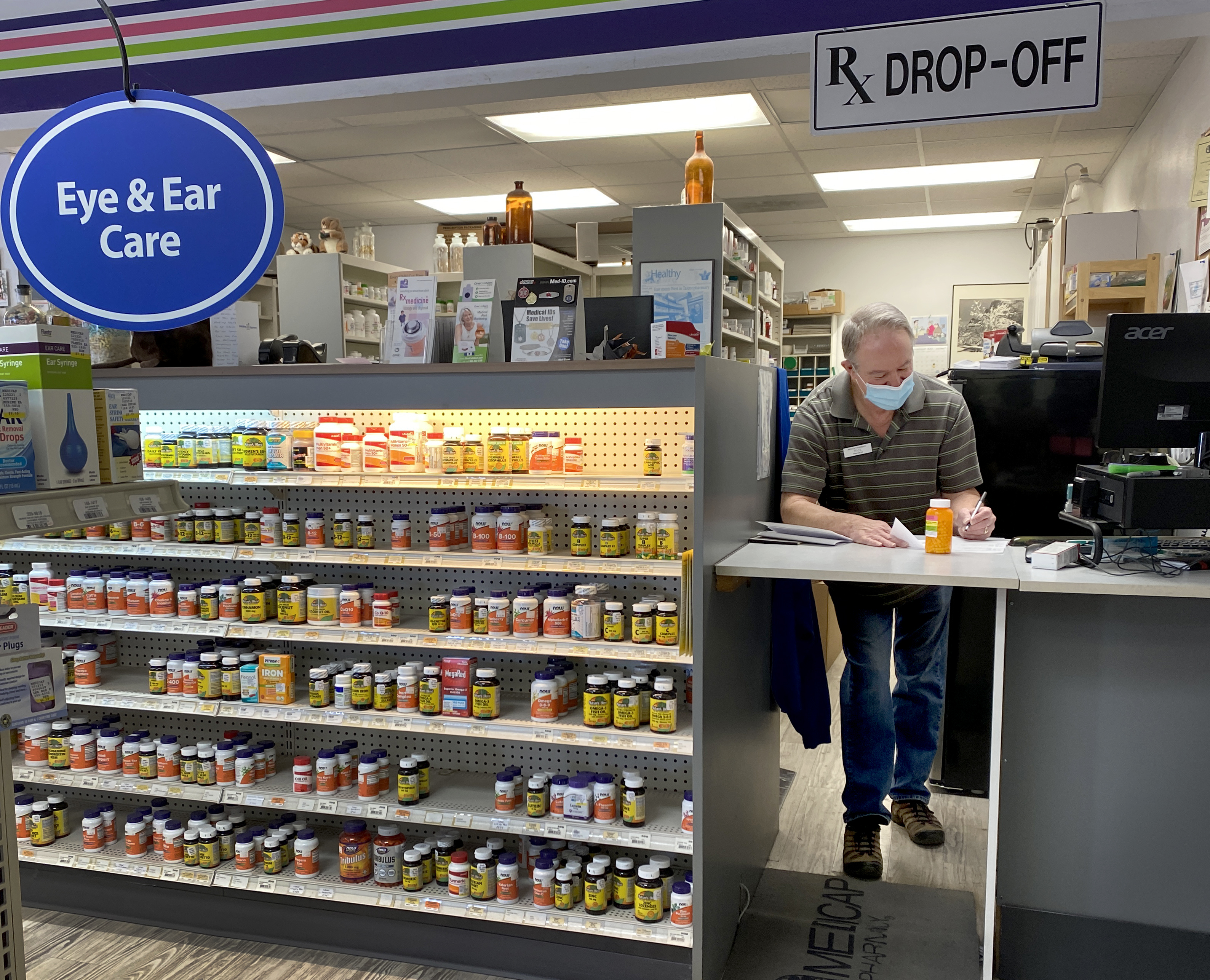
FILE: Pharmacist and Medicap Pharmacy owner Rick Chester processes prescription orders in Talent, Ore., in December 2020.
April Ehrlich / OPB
Cindy Timmons is getting used to living in a one-pharmacy town.
The Umatilla County commissioner lives in Milton-Freewater, a town of about 7,000 located a few miles south of the Oregon-Washington border. Up until late last year, Milton-Freewater had two pharmacies: Rite Aid and Safeway.
And then in November, Rite Aid’s corporate office announced that it was closing more than a dozen locations across the Northwest. Milton-Freewater was on the list.
With the Rite-Aid closed, the pharmacy at Safeway is the only game in town.
“They’re working very, very hard to do great customer service,” she said. “But if you go in certain times, the line’s right out the door.”
Timmons said the Safeway pharmacy is one of the few medical services in town. There are no doctors who practice in Milton-Freewater, she said, and the closest are in Walla Walla, Washington, 10 miles to the north or Pendleton 30 miles to the south.
The Milton-Freewater closure is part of an ongoing trend that’s seeing pharmacy chains pull out of rural Oregon. Rite Aid, which is in the midst of bankruptcy proceedings, also shuttered its stores in Hermiston and Hines as it targets “underperforming” stores for closure. Other chains like Walgreens and Bi-Mart had already closed Eastern Oregon pharmacies in prior years.
That leaves independent pharmacies. But they too are shrinking in Oregon, a fact they blame on an obscure link in the pharmaceutical supply chain: pharmacy benefit managers.
That’s why independent pharmacists across Oregon are lining up behind House Bill 4149, a piece of legislation with bipartisan support that received a hearing with the House Committee on Behavioral Health and Health Care earlier this month.
Pharmacy benefit managers, or PBMs, are middlemen in the drug supply chain, acting as a go-between for pharmacies, insurance companies and drug manufacturers. Pharmacies rely on PBMs to work with insurers for reimbursements on the drugs they dispense, but independent pharmacies say inadequate reimbursements and excessive fees make it tough for them to stay in business.
“The PBMs are sucking the literal lifeblood out of our pharmacy delivery system with below cost reimbursement and direct and indirect remuneration fees, which is visible now not just in rural areas where I’m from, but also in urban ones as well,” pharmacist Ann Murray said.
Murray co-owns Murray’s Drug, an independent pharmacy headquartered in Heppner that serves rural Morrow, Umatilla and Gilliam counties. Last year, Murray and her husband John testified in support of a similar bill that aimed to regulate the PBM industry more tightly. Despite strong bipartisan support and passage in the House, that bill died in the Senate.
Like its predecessor, HB 4149 would require all PBMs to apply for licensing with the state and follow certain transparency and pricing rules to maintain their license. One of those rules includes a prohibition on “clawback” fees charged to pharmacies after a sale is done.
The intervening year between the 2023 and 2024 legislative sessions has only added more fuel to the debate.
In August, the Oregon secretary of state released an audit that found PBMs reimbursed independent pharmacies less than they did national chains.
And pharmacies are continuing to drop off the map. In 2023, 35 pharmacies closed in Oregon, said state Rep. Nancy Nathanson, D-Eugene, a chief sponsor of the bill.
Jack Holt, the owner of a small chain of pharmacies in northwestern Oregon and southwestern Washington told legislators in 2023 that he had closed two locations. He returned in 2024 and testified that he had closed two more in Dallas and Mt. Angel, adding that three more stores were “struggling.”
He noted that the same factors hurting independent pharmacies are starting to affect their corporate counterparts.
“It’s not because they don’t want to help people,” he said. “It’s because the PBMs continue to ratchet down the payments for the drugs and services that the pharmacies provide.”
PBMs have previously argued that they are more consumer-focused and independent pharmacies were being threatened by other economic factors.
While PBM lobbyists opposed last year’s bill, they appeared more amenable to HB 4149 after sponsors removed some language targeting dispensing fees.
As the bill continues to wind its way through Salem, rural Oregon is still dealing with the fallout from pharmacy closures.
Hines, a town of 1,600 in southeast Oregon, was also on the Rite Aid closure list.
Hines city administrator Kirby Letham said the store used to place prominently in the town’s commercial hub, which featured a few smaller stores and restaurants. Rite Aid’s closure left behind a sizable gap in the local economy.
Letham said the closest pharmacy is now a Safeway in neighboring Burns. Like Milton-Freewater, he said demand for prescriptions at Safeway has only grown.
Letham said Rite Aid continues to pay its water bill even after vacating the building. He hopes that they could return one day after they emerge from bankruptcy, but he knows it’s only a dream at this point.

